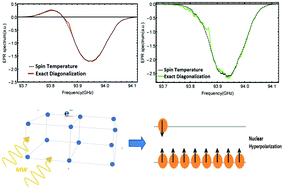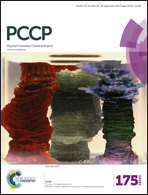Evidence of spin-temperature in dynamic nuclear polarization: an exact computation of the EPR spectrum
Abstract
In dynamic nuclear polarization (DNP) experiments, the compound is driven out-of-equilibrium by the microwave (MW) irradiation of the radical electron spins. Their stationary state has been recently probed via electron double resonance (ELDOR) techniques showing, at low temperature, a broad depolarization of the electron paramagnetic resonance (EPR) spectrum under microwave irradiation. In this theoretical manuscript, we develop a numerical method to compute exactly the EPR spectrum in the presence of dipolar interactions. Our results reproduce the observed broad depolarisation and provide a microscopic justification for the spectral diffusion mechanism. We show the validity of the spin-temperature approach for typical radical concentration used in dissolution DNP protocols. In particular once the interactions are properly taken into account, the spin-temperature is consistent with the non-monotonic behavior of the EPR spectrum with a wide minimum around the irradiated frequency.


 Please wait while we load your content...
Please wait while we load your content...